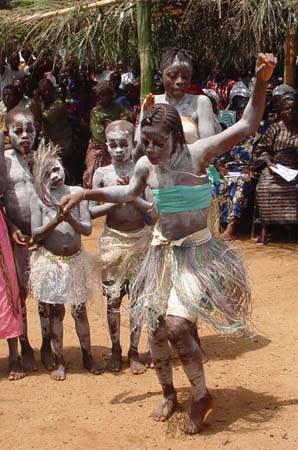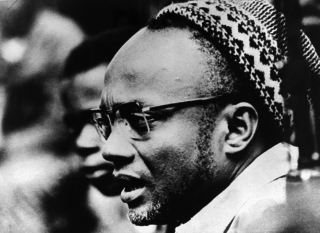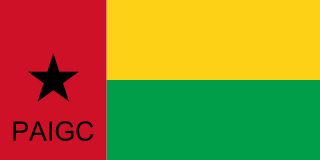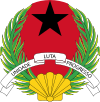Related Research Articles

Guinea-Bissau, officially the Republic of Guinea-Bissau, is a country in West Africa that covers 36,125 square kilometres (13,948 sq mi) with an estimated population of 2,026,778. It borders Senegal to its north and Guinea to its southeast.
People have inhabited the region now known as Guinea-Bissau for thousands of years. In the 13th century, it became a province of the Mali Empire that later became independent as the Empire of Kaabu. Portugal claimed the region beginning in the 1450s. During most of this period, Portuguese control of the region was limited to a number of forts along the coast. Portugal gained full control of the mainland after the pacification campaigns of 1912–15. The offshore Bijago islands were not colonised until 1936. After independence in 1974, the country was controlled by a single-party system until 1991. The introduction of multi-party politics in 1991 brought the first multi-party elections in 1994. A civil war broke out from 1998 to 1999.

Cape Verde is known internationally for morna, a form of folk music usually sung in the Cape Verdean Creole, accompanied by clarinet, violin, guitar and cavaquinho. Funaná, Coladeira, Batuque and Cabo love are other musical forms.

Sierra Leone's music is a mixture of native, French, British, West Indian and Creole musical genres.

Amílcar Lopes Cabral was a Bissau-Guinean and Cape Verdean agricultural engineer, political organizer, and diplomat. He was one of Africa's foremost anti-colonial leaders. He was also a pan-Africanist and intellectual nationalist revolutionary poet.

Portuguese Guinea, called the Overseas Province of Guinea from 1951 until 1972 and then State of Guinea from 1972 until 1974, was a West African colony of Portugal from 1588 until 10 September 1974, when it gained independence as Guinea-Bissau.

João Bernardo "Nino" Vieira was a Bissau-Guinean politician who served as President of Guinea-Bissau from 1980 to 1999, except for a three-day period in May 1984, and from 2005 until his assassination in 2009.
Articles related to Guinea-Bissau include:

The Revolutionary Armed Forces of the People or FARP were originally the armed wing of the African Party for the Independence of Guinea and Cape Verde during the struggle against Portuguese rule in Guinea-Bissau and Cape Verde. Since 1973, they constitute the national armed forces of Guinea-Bissau. A separate Cape Verdean branch of the FARP constituted the national armed forces of this country from 1975 until the early 1990s, when these were renamed "Cape Verdean Armed Forces".

Portuguese is spoken in a number of African countries and is the official language in six African countries: Angola, Mozambique, Guinea-Bissau, Cape Verde, São Tomé and Príncipe and Equatorial Guinea. There are Portuguese-speaking communities in most countries of Southern Africa, a mixture of Portuguese settlers and Angolans and Mozambicans who left their countries during the civil wars. A rough estimate has it that there are about 14 million people who use Portuguese as their sole mother tongue across Africa, but depending on the criteria applied, the number might be considerably higher, since many Africans speak Portuguese as a second language, in countries like Angola and Mozambique, where Portuguese is an official language, but also in countries like South Africa and Senegal, thanks to migrants coming from Portuguese-speaking countries. Some statistics claim that there are over 60 million Portuguese speakers in the continent.
The coladeira is a music genre from the Cape Verde islands in the central Atlantic Ocean.
Gumbe, also goombay or gumbay, is a West African style of music found in countries such as Sierra Leone and Guinea-Bissau. Sierra Leonean gumbe music is indigenous to the Sierra Leone Creole people and was derived from the Jamaican Maroon ancestors of the Creole people. Creole musicians such as Ebenezer Calendar and Dr Oloh popularized gumbe music in Sierra Leone and in other West African locales.
This name uses Portuguese naming customs. the first or maternal family name is Ndafa and the second or paternal family name is Kabi.

Guinean Portuguese is the variety of Portuguese spoken in Guinea-Bissau, where it is the official language.
Tabanka is a musical genre of Cape Verdean music.

The Balanta are an ethnic group found in Guinea-Bissau, Guinea, Senegal, Cape Verde and The Gambia. They are the largest ethnic group of Guinea-Bissau, representing more than one-quarter of the population. Despite their numbers, they have remained outside the colonial and postcolonial state because of their social organisation. The Balanta can be divided into six clans: Nhacra, Ganja (Mane), Naga, Patch, Sofar and Kentohe. The largest of which are the Balanta Kentohe.

The official language of Guinea-Bissau is Portuguese, which was spoken by 32.1% of the population according to the 2009 census. It is the language of instruction in schools, the language of literary production, the written press, legislation and administration.

On 12 April 2012, a coup d'état in Guinea-Bissau was staged by elements of the armed forces about two weeks before the second round of a presidential election between Carlos Gomes Júnior and Kumba Ialá. The coup started in the evening with military personnel and equipment making its way onto the streets, followed by the state-owned media being taken off-air.
Bissau-Guinean Americans are Americans of Bissau-Guinean descent. As was the case with almost all current West African coastal countries, the first people in the United States from present-day Guinea-Bissau were imported as slaves. Thus, in the 21st century, there are many African Americans who have discovered, through DNA analysis, they descend mainly or at least partly, from Bissau-Guinean enslaved people.

Artur Nunes was an Angolan musician, composer, and activist. In his time, Nunes was one of the most influential voices and composers in the pre-independence days of revolutionary Angola. Nunes, along with David Zé, Urbano de Castro and many others, was a part of a group of musicians called the FAPLA-Povo Alliance who had the role to spread and divulge awareness to Angolan citizens helping a movement of revolution. He was nicknamed "O Espiritual" due to his expertise in manifesting his feelings in a rather contagious way as if he could communicate with souls.
References
- de Klein, Guus. "The Backyard Beat of Gumbe". 2000. In Broughton, Simon and Ellingham, Mark with McConnachie, James and Duane, Orla (Ed.), World Music, Vol. 1: Africa, Europe and the Middle East, pp 499–504. Rough Guides Ltd, Penguin Books. ISBN 1-85828-636-0
